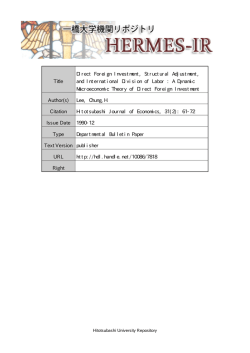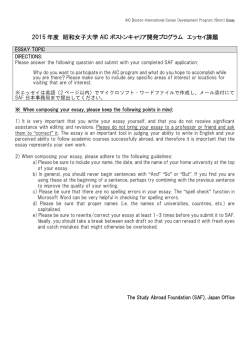
[To acquire ability to think, act and transmit information in English] 1
[To acquire ability to think, act and transmit information in English] ※ General education courses■ ※ Faculty courses■ 1年次 2年次 3年次 Global Studies:Culture and Society A① Global Studies:Culture and Society B② Seminar in International Culture I Seminar in International Culture III Seminar in International Culture II Seminar in International Culture IV Japanese-English Contrastive Linguistics Introduction to English Linguistics I Ancient Greco-Roman Culture and Society Graduation Thesis History of English and American Literature Global Studies : Global Issues ③ Specialized areas of interest 4年次 Cultural Studies in Western Europe and North America Introduction to English Linguistics II Ethnicity in Multicultural Society Survey of American Literature Introduction to International Culture A History of Western Europe and North America Survey of British Literature ④ ⑤ History of Renaissance Culture British Cultural Studies Modern History of Western Europe Deepening knowledge Cultural Exchange European Union International Labor Migration History of Western Art I History of Italian Culture History of Western Art II French Cultural Studies Pracatical skills training Research Project A Seminar on Practice A Seminar on cooperation with the local community A ◎Experimental Seminar in Art and Culture Global Career Design ◎Basics of Arts and Sciences ◎Introduction to International Studies ◎Basic Research Methods in International Studies ◎Information Literacy Basic Basic skills training (Common & Faculty undergraduate subjects) International Relations Ecological Design Non-profit and Non-governmental Organizations Comparative Culture Music and Society Cultural Policy and Law Introduction to Philosophy Arts and Society Education in Different Cultures Cultural Anthropology Information Literacy Application A Social Psychology Contemporary International Society Information Literacy Application B History of Social Thinking Law and Society Presentation Methods Culture of Music Human Rights Cultural Policy Multicultural Community Building Society and Statistics Arts Management Civil Society English I A (Conversation) English I B (Reading and Writing) English III A (Conversation) English III B (Reading and Writing) English II A (Conversation) English IV A (Conversation) English II B (Reading and Writing) Multimedia English I English IV B (Reading and Writing) Business English I Business English II Multimedia English III Multimedia English II Foreign languages Basic English Composition ⑥ ⑦ ⑧ Advanced English (Interpretation Skills)⑨ Advanced English (Translation Skills) ⑩ Advanced English (Tourism Skills) Advanced English (Conference Skills) French I A French I B French II A French II B External Foreign Language Tests A・B Intensive Language Study Abroad Programs A・B Study abroad & Language training Semester/Year Study Abroad Programs A・B ※ Credits earned at a partner institution will be accepted as SUAC credits upon consideration and approval by the Faculty Committee. Note ※ English names are unofficial. [To acquire ability to think, act and transmit information in English] summaries ①〔Global Studies: Culture & Society A〕 This course will introduce important aspects of global culture and society through a survey of western classical music history. By drawing on historical examples of significant pieces of western classical music basic principles of rhythm, melody, and form will be analyzed. An overview of the historical context of the important periods in classical music, from the Medieval period through to present, will be presented. Particular attention will also be paid to demonstrating to how both the global and local cultural and political circumstances of each period exerted an influence on how much of western classical music was composed. ②〔Global Studies: Culture & Society B〕 This course will review Western cultural themes and how they are reflected in Western film. Important cultural and social themes as represented in western film will be introduced and discussed. Iconic films and characters will be explained in terms of how they reflected or foreshadowed changes in society. Specific focus will be placed on commonly held Western cultural norms and beliefs. Themes expected to be covered include democracy, war, technology, multiculturalism, the breakdown of the traditional family, love and spiritualism in modern times. The goal of the course is for students to become knowledgeable with the cultural themes explored in western films and how they reflect the values of western culture. ③〔Global Studies: Global Issues〕 As a leading developed country with an aging population and declining birthrate, Japan’s future truly depends on its youth, its future leaders, being aware of significant global issues. Similarly, as globalization continues its unstoppable advance good language skills, particularly English skills, are becoming ever more necessary as well. This course offers students a survey of some important global issues including climate change, migration, food and water security, multiculturalism and volunteerism among others. The goal of the course is to deepen students’ knowledge and understanding of some of the critical issues affecting the entire world today. Issues will be examined in terms of the political, economic, social and cultural relationships affecting us all. ④〔Survey of British Literature〕 This course will survey the trajectory of British literature by focusing on the historical, cultural, and literary significance of works by British writers from the foundational texts to the postmodern era. Major periods to be covered will include: the Old English (or Anglo-Saxon) Period, the Middle English Period, the English Renaissance, the Neoclassical Period, the Romantic Period, the Victorian Period, the Modern Period and the Postmodern Period. Through lectures, discussions, audio-visual resources and presentations students will develop a greater appreciation of English language, literature and culture. ⑤〔Survey of American Literature〕 This course will analyze the most significant American post-war literary and visual works or art with an emphasis on the historical background of the United States and particular focus on American culture and regional social issues such as immigration and intercultural issues among others. Students will be expected to do research into original sources, video material and other literary materials and report on their results in a group presentation. Oral presentations will be followed by question and answer sessions in which comments, thoughts and impressions of the literary works discussed will be exchanged. ⑥〔English Composition〕 The purpose of this course is to introduce the basic patterns of various registers of English writing from academic essay writing, business writing and e-mail communication to casual online chatting. Students will learn how to organize their thoughts and express their ideas by following the basic patterns and formulas used when writing in English. Understanding the basic patterns necessary when writing in English, and being able to use them appropriately, is an important goal of this writing course. Weekly assignments will require students to practice writing over the entire semester. Students will be expected to develop a functional level of mastery allowing them to organize their ideas and communicate their meaning appropriately in all registers covered in class. ⑦〔Advanced English(Tourism)〕 Students will acquire the practical skills necessary to serve as both domestic and international English tour guides and tour conductors. As Japanese go abroad ever more easily and frequently both the national and prefectural governments in Japan have been focusing increasingly on the tourism industry. As such, it is imperative to have the ability to effectively handle the variety of situations we may encounter while traveling, as well as important tourismrelated terms and expressions. With an eye on life post-graduation, this course should be a part of the career path of anyone aspiring to a future job using English. ⑧〔Advanced English (Conference)〕 International conferences and meetings are increasingly using English as the medium of communication and there is a real need for people with both the language skills and the leadership ability to serve as chairpersons, moderators and masters of ceremonies of these events. The focus of this course will be on teaching the skills necessary to successfully carry out these jobs. Specific areas to be addressed include: opening remarks, introducing participants, addressing the audience, explaining the agenda, ensuring proper event flow, summarizing the opinions of speakers and even making jokes when appropriate. In order to develop the required language skills, events will be simulated and students will be expected to practice by role-playing in class. Students will also learn how to explain positions and opinions in writing and further develop their ability to negotiate with others through question-and-answer sessions. ⑨〔Advanced English (Interpretation)〕 This course is an important one on the career path of the student who hopes to be a professional interpreter, a volunteer interpreter or to work for a multinational company in our increasingly internationalized society. Areas to be covered include interpreter training principles, shadowing, sight translation, paragraph-by-paragraph summary and translation and the ability to quickly switch from Japanese to English and vice versa. As the number of foreigners living in Japan continues to increase community interpreters can play important roles as bridges between languages and cultures. As such, the fields of judicial, medical, school, and administrative interpretation will also be covered. ⑩〔Advanced English (Translation)〕 This is an introductory course on the career path for anyone hoping to pursue a career as a translator in the future. It is often said that translation is best learned by the experience of doing it. However, being able to learn translation theory and methods, actually practicing translation in class and learning the importance and difficulty of translation in the classroom are skills that will serve anyone well as they prepare for their future career. Having a knowledge of English grammar and a dictionary are necessary but not sufficient conditions to be able to do translation. Students will learn translation theory and then be expected to do extensive practice translating in various fields including expository writing, commentaries, essays, novels, picture books, comics, subtitles, song lyrics, manuals, catalogs, business letters, contracts and advertising statements. [To acquire ability to think, act and transmit information in English](日本語) ※全学科目は■ ※学部科目■ 1年次 2年次 3年次 4年次 Global Studies:Culture and Society A Global Studies : Culture and Society B 国際文化演習 I 国際文化演習 III 英米文学史 Global Studies : Global Issues 国際文化演習 II 国際文化演習 IV 日英語比較研究 英語学概論 I 古代ギリシア・ローマ文化と社会 卒業論文 関心のある 西欧・北米文化論 英語学概論 II 専門分野の追究 多文化とエスニシティ 英米文学概論 A 国際文化入門 A 英米文学概論 B 西欧・北米の歴史 ルネサンス文化史 イギリス文化論 西欧近現代史 知識・思考力の深化 文化交流論 EU論 国際労働力移動論 美術史 (西洋) Ⅰ イタリア文化史 美術史 (西洋) Ⅱ フランス文化論 実践力養成 テーマリサーチプロジェクト A テーマ実践演習 A 地域連携実践演習 A ◎文化芸術体験演習 グローバル・キャリア・デザイン概論 ◎学芸の基礎 ◎国際文化概論 ◎国際文化基礎論 基礎力養成 (全学共通・学部共通の科目) ◎情報リテラシー基礎 国際関係論 エコロジカルデザイン NPO・NGO論 比較文化論 音楽と社会 文化政策と法 哲学 芸術と社会 異文化と教育 文化人類学 情報リテラシー応用 A 社会心理学 現代の国際社会 情報リテラシー応用 B 社会思想史 法と社会 プレゼンテーション技法 音楽文化論 人権論 文化政策概論 多文化共生論 社会と統計 文化政策概論 市民社会論 英語コミュニケーション I A 英語コミュニケーション III A ビジネス英語 I 英語コミュニケーション I B 英語コミュニケーション III B ビジネス英語 II 英語コミュニケーション II A 英語コミュニケーション IV A 英語コミュニケーション II B 英語コミュニケーション IV B マルチメディア英語 I マルチメディア英語 III マルチメディア英語 II 外国語 英語表現法 英語上級 観光英語 英語上級 会議英語 英語上級 通訳 英語上級 翻訳 フランス語コミュニケーション I A フランス語コミュニケーション I B フランス語コミュニケーション II A フランス語コミュニケーション II B 外部検定A・B 留学・語学研修など 短期語学留学A・B 集中語学研修A・B ※ また、留学先の科目も申請により、教授会の審議後単位が認められる
© Copyright 2026



